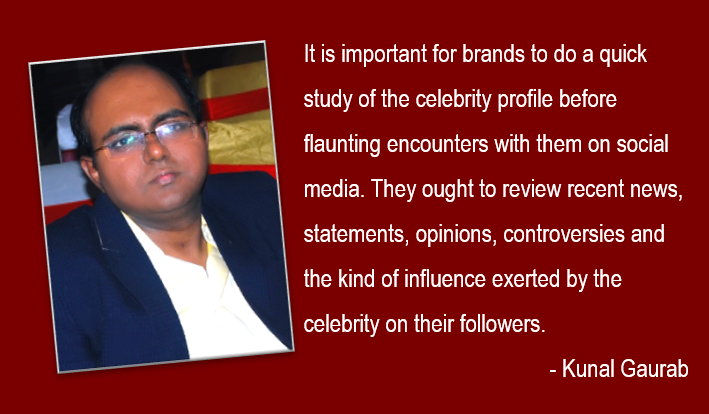Organisations and brands have to be more careful in appropriating, aligning, endorsing or acknowledging their patrons, well-wishers or friends, who are active in the public domain. Brands take pride in flaunting their relations with their celebrity or highly-accomplished customers. This is largely done through their social media pages and through their websites. This mostly has a positive rub off on brands. It certainly gives some spike to the conversations around the brand and helps in building positive sentiments. The brands in hospitality, banking and aviation industries have many impromptu encounters with celebrity customers. These encounters happen mostly, when they come to avail the services in their private capacities. Brands display these encounters to add strong authentic vibes in their overall brand imageries.
However, sometimes it becomes tricky to decide on the celebrity or public figure that these brands want to flaunt on social media as it has become a double-edged sword, especially on Twitter and Facebook. Twitter, more so as it is undoubtedly sharper than any other social media channel. This could be attributed to the politically-motivated-ideological-divisiveness propagated on it. Many celebrities, public figures, accomplished professionals and achievers from different fields such as art, music, sports, business and social life have endorsed and expressed their ideological preferences, openly. Hence, they become influencers for people skewed towards a particular ideology. The thin line between apolitical and political is constantly blurring. Hence, the communication team entrusted with this critical role needs to broaden their horizon and look beyond the hygiene factors for selecting the personality and relation they want to showcase. The current scenario demands effective sensitisation and behavioural checks by the communication team before posting any such update.
Halo effect
When they receive the image or video of a celebrity on any of their properties, the communication team should not get carried away by the aura of that celebrity. Such cognitive biases engender a skewed decision making that could lead to trouble. Regardless of the stature of the celebrity, it needs further probe since the situation and sentiments are highly fragile on social media.
A quick analysis is required
It is important to do a quick study of the profile of the celebrity or public figure before posting about them. The components of the audit must not only be limited to the quantitative figures. It must also find out recent news, statements, opinions, controversies related to them.
Their recent activities on social media, insight on followers and the kind of influence which is exerted by them on the followers should also be factored in.
Relationship with followers
It is important to gauge the kind of relationships that these celebrities hold with their followers. Is it of an entertainer, friend, philosopher, source of inspiration or an ideologue? This may help in gauging the kind of sentiments evoked by posting his/her image by the brand.
Political / Ideological allegiance
Political or ideological allegiance of the celebrity or public figure should be treated as one of the defining criteria for acknowledging or flaunting them on social media. The celebrity vocal about his/her strong to medium allegiance to a particular political party or ideology can
alienate the followers of other ideological or political groups and neutral audiences. Appropriating such celebrities can backfire on the brand and it will be quickly perceived as acknowledging the political allegiance of that celebrity. This can also lead to a backlash on social media. Hence, showcasing the relation with a neutral or mildly-vocal celebrity will guard the brand against any such fiasco.
Recently, Air Vistara was in the eye of the storm for posting and proudly acknowledging the patronage of Major General G D Bakshi. He is known for expressing very strong views on issues such as nationalism, politics and security, which has won him detractors and followers in
equal measures. Air Vistara took down the post after receiving severe criticism from his detractors on social media. This led to outrage from his supporters and followers. Eventually, Air Vistara salvaged the situation by sending its officials to Major General Bakshi’s home with
an apology and by receiving a positive testimony from him. However, it led to huge embarrassment for the brand.
Therefore, communications teams must take lessons from such episodes and exercise more due diligence before posting any celebrity-related post on social media. A more circumspective and restrained approach can save brands from embarrassment. Brands should not forget to cross check the level of political or ideological engagement of celebrities as hygiene.
The views expressed here are that of the author and do not necessarily reflect that of Reputation Today.



Good and insightful thought !!